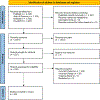Recognizing the psychological impact of a glioma diagnosis on mental and behavioral health: a systematic review of what neurosurgeons need to know
- PMID: 36334288
- PMCID: PMC10413205
- DOI: 10.3171/2022.9.JNS221139
Recognizing the psychological impact of a glioma diagnosis on mental and behavioral health: a systematic review of what neurosurgeons need to know
Abstract
A cancer diagnosis is life altering and frequently associated with both acute and long-lasting psychosocial and behavioral distress for patients. The impact of a diffuse glioma diagnosis on mental health is an important aspect of the patient experience with their disease. This needs to be understood by neurosurgeons so these concerns can be appropriately addressed in a timely fashion and integrated into the multidisciplinary care of neuro-oncology patients. The relatively grave prognosis associated with diffuse gliomas, the morbidity associated with treatment, and the constant threat of developing a new neurological deficit all can negatively affect a patient's mental ability to cope and ultimately manifest in mental health disorders such as anxiety and depression. The objective of this systematic review was to describe the variety of behavioral health disorders patients may experience following a glioma diagnosis and discuss possible treatment options. The PubMed, Web of Science, Embase, and PsycINFO databases were searched through July 1, 2022, using broad search terms, which resulted in 5028 studies that were uploaded to Covidence systematic review software. Duplicates, non-English-language studies, and studies with irrelevant outcomes or incorrect design were removed (n = 3167). A total of 92 articles reporting behavioral health outcomes in brain tumor patients were categorized and extracted for associations with overall mental health, anxiety, depression, distress, stress, pharmacology, interventions, and mental health in caregivers. The authors identified numerous studies reporting the prevalence of mental health disorders and their negative influence in this population. However, there is a paucity of literature on therapeutic options for patients. Given the strong correlation between patient quality of life and mental well-being, there is a considerable need for early recognition and treatment of these behavioral health disorders to optimize everyday functioning for patients.
Keywords: glioma; mental health; neurobehavioral; oncology; primary brain tumor; psychosocial; quality of life.
Figures


Similar articles
-
Beyond the black stump: rapid reviews of health research issues affecting regional, rural and remote Australia.Med J Aust. 2020 Dec;213 Suppl 11:S3-S32.e1. doi: 10.5694/mja2.50881. Med J Aust. 2020. PMID: 33314144
-
Glioma patients in outpatient care-optimization of psychosocial care in neuro-oncological patients (GLIOPT): Protocol for a cluster randomized controlled trial.Trials. 2020 May 27;21(1):434. doi: 10.1186/s13063-020-04321-2. Trials. 2020. PMID: 32460811 Free PMC article.
-
Psychosocial interventions for informal caregivers of lung cancer patients: A systematic review.Psychooncology. 2020 Feb;29(2):251-262. doi: 10.1002/pon.5271. Epub 2019 Nov 24. Psychooncology. 2020. PMID: 31701588
-
Changing practice to improve quality of life in glioma.J Neurosurg. 2024 May 10;141(5):1270-1280. doi: 10.3171/2024.2.JNS221799. Print 2024 Nov 1. J Neurosurg. 2024. PMID: 38728762 Review.
-
Web-Based Interventions to Improve Mental Health, General Caregiving Outcomes, and General Health for Informal Caregivers of Adults With Chronic Conditions Living in the Community: Rapid Evidence Review.J Med Internet Res. 2017 Jul 28;19(7):e263. doi: 10.2196/jmir.7564. J Med Internet Res. 2017. PMID: 28754652 Free PMC article. Review.
Cited by
-
The surgical management of diffuse gliomas: Current state of neurosurgical management and future directions.Neuro Oncol. 2023 Dec 8;25(12):2117-2133. doi: 10.1093/neuonc/noad133. Neuro Oncol. 2023. PMID: 37499054 Free PMC article.
-
Emotionally focused couple therapy in cancer survivor couples with marital and sexual problems: a replicated single-case experimental design.Front Psychol. 2023 May 2;14:1123821. doi: 10.3389/fpsyg.2023.1123821. eCollection 2023. Front Psychol. 2023. PMID: 37205090 Free PMC article.
-
Pre-treatment Emotional Distress in Patients Irradiated for Malignant Glioma.In Vivo. 2023 May-Jun;37(3):1198-1204. doi: 10.21873/invivo.13196. In Vivo. 2023. PMID: 37103101 Free PMC article.
-
Technical Aspects of Motor and Language Mapping in Glioma Patients.Cancers (Basel). 2023 Apr 6;15(7):2173. doi: 10.3390/cancers15072173. Cancers (Basel). 2023. PMID: 37046834 Free PMC article. Review.
-
Financial toxicity in patients with glioblastoma.J Neurooncol. 2025 Jan;171(1):75-83. doi: 10.1007/s11060-024-04835-8. Epub 2024 Oct 16. J Neurooncol. 2025. PMID: 39412733
References
Publication types
MeSH terms
Grants and funding
LinkOut - more resources
Full Text Sources
Medical

